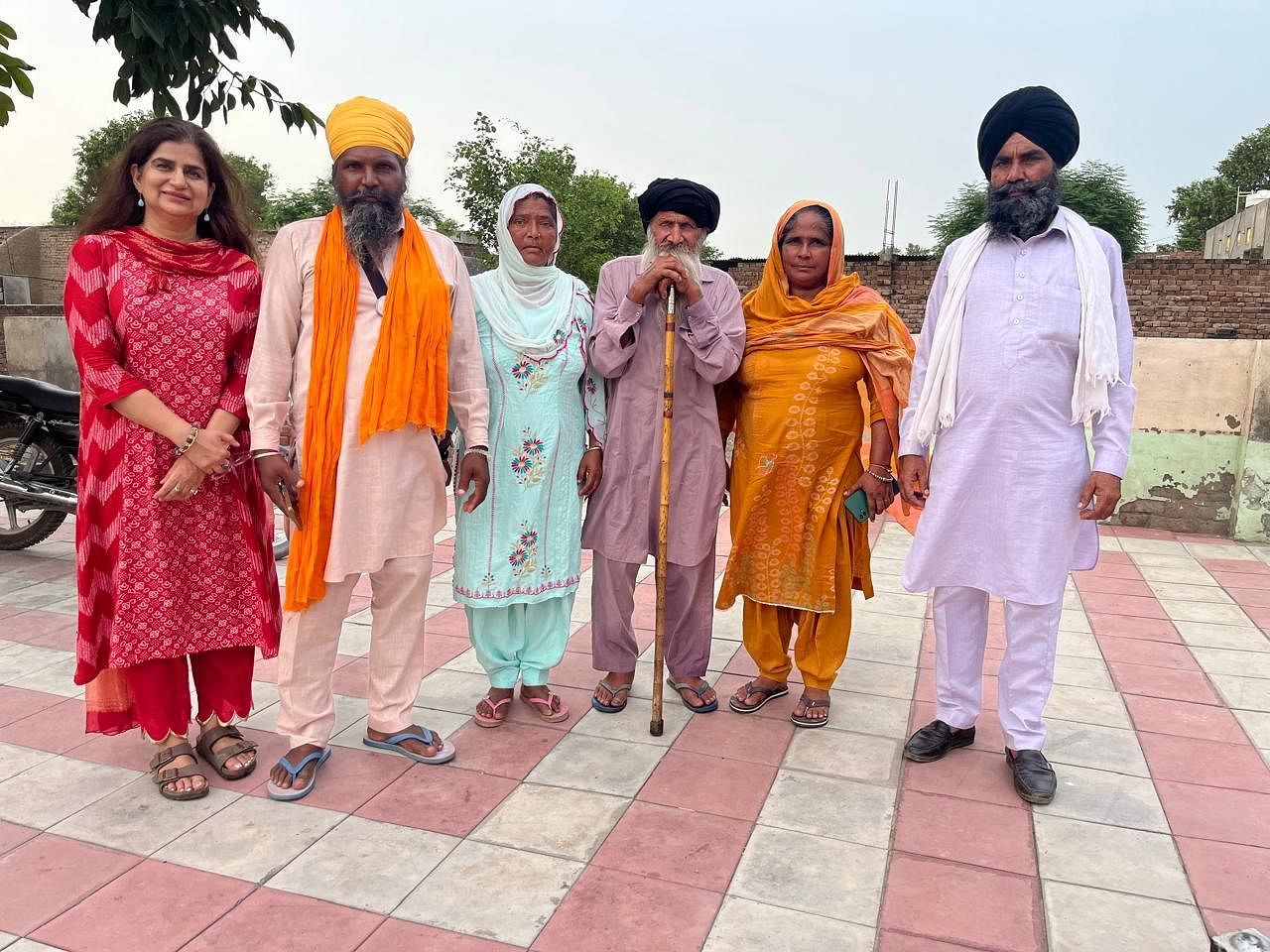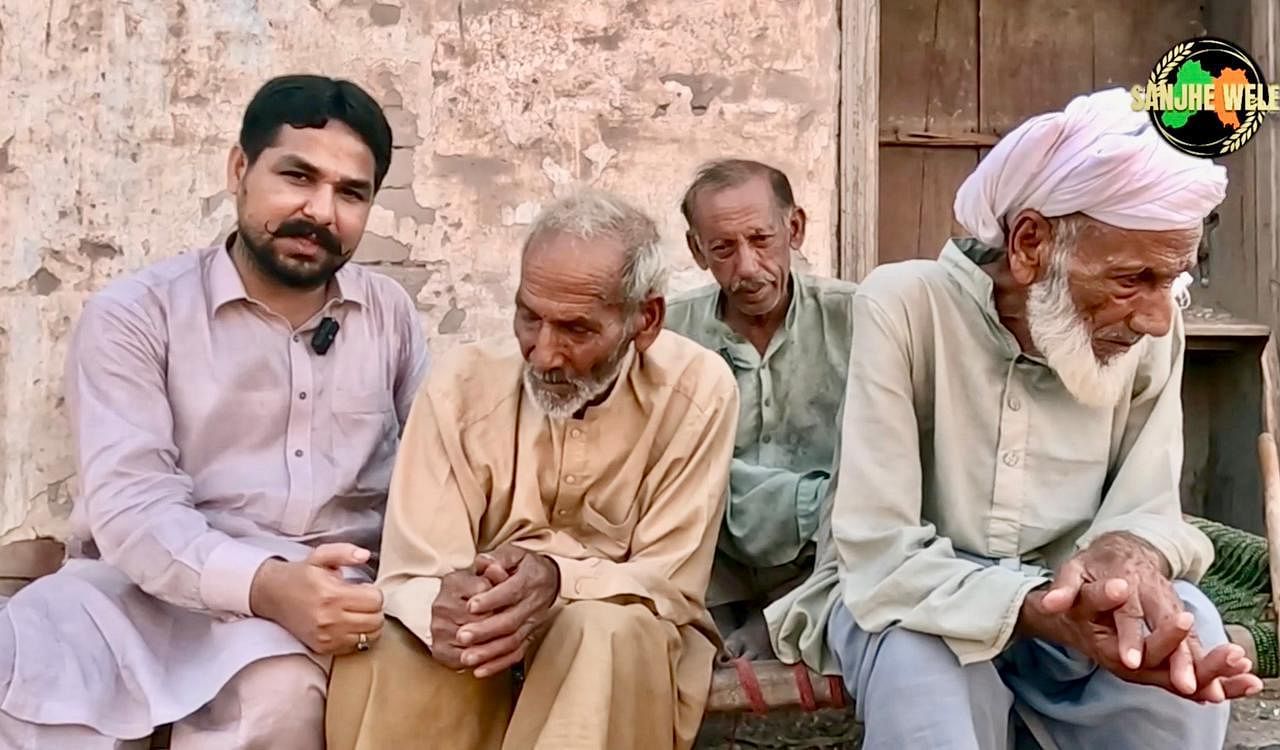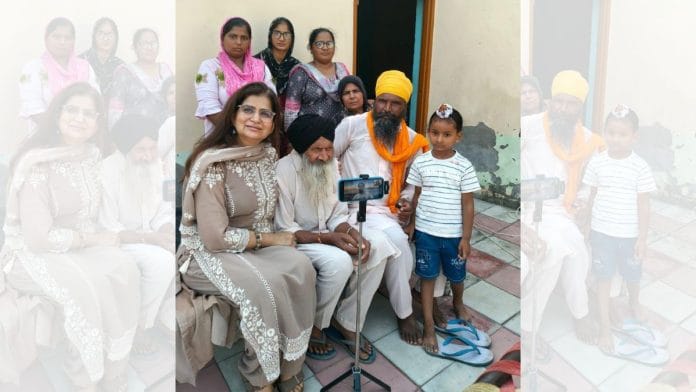New Delhi: When Nonica Datta, professor of modern Indian history at Jawaharlal Nehru University, set out for her fieldwork on the borderlands of Punjab, she could never have anticipated uncovering a story that was buried for over seven decades. What began as a routine interview about the borderlands quickly turned into something much more profound—a personal journey to uncover a family’s lost history that spanned 77 years, from India to Pakistan.
It was in a remote border village Bandala, along the Tarn Taran road just a few miles from the Attari-Wagah border, where Datta met Mahinder Singh Gill, an 87-year-old man—‘a gentle, reserved Sikh elder’.
Through a series of meetings, Gill slowly opened up about the horrors of 1947, when, as a 10-year-old boy, he was violently separated from his family during the chaos of Partition. His family—Muslim by faith—lived in the village of Bulloke in Zira tehsil, Ferozepur. Gill, who was named Muhammed Shafi at birth, recalled with vivid detail how, in the bloodshed and violence that tore the region apart, he was torn away from his parents, four brothers, and his sister.

“He had no clue what happened to his family. Seventy-seven years had passed, but he remembered everything in vivid detail,” Datta told ThePrint.
In a bid to garner support for Gill’s cause, Datta had also written an article in The Tribune.
Also read: ‘Not all inheritances from Partition are traumatic.’ Some stories are ‘celebrations’ too
Families torn apart
His family lived in the village of Bulloke in what was then Indian Punjab—just a stone’s throw from what would soon become the new border with Pakistan.
But, even before the border was officially demarcated, there was uncertainty and fear in the region. Ferozepur, an area caught in the crossfire of the Radcliffe Line debates, was initially allocated to Pakistan. This shaped Gill’s life.
It was amid this chaos that Gill’s family found themselves at the mercy of violent mobs as they tried to flee their home.
As the violence escalated, Gill was separated from his father and was forced to move from village to village to escape mob attacks. It was in this state of confusion and fear that a Sikh man, Mangal Singh, took in Gill. Singh was settled in the village of Bandala, near the India-Pakistan border. The family adopted him, and he grew up as a Sikh, far from the life he once knew.
There was a moment after the separation when Gill’s family almost reunited. Two months after the separation, a neighbour informed his family about a letter from Mangal Singh. It said Singh would bring Gill to the Ganda Singh border. But when they arrived, chaos erupted due to an unrelated matter—shots were fired from both sides. Not wanting to risk it, Singh turned about taking Gill with him. His brothers remember Gill looking back at them and not being able to do anything about his fate.
While reviewing her notes one day in Delhi, Datta decided to search for the village of Bulloke online. She hoped to learn more about the village’s fate. To her surprise, she stumbled upon a YouTube channel by Abbas Khan Lashari, a local historian. The channel, called ‘Sanjhe Vele’, or “The Age of Unity,” featured videos of elderly men reminiscing about their lives after Partition.
As Datta scrolled through, she was struck by one video, which mentioned a lost family member—a brother who had disappeared. The video, titled Veer di Udeek (Waiting for the Brother), revealed how two brothers had been waiting for their sibling for more than seven decades. She stopped in her tracks. Could this be the same family that Gill had told her about?

“I couldn’t believe it,” Datta recalled. “It was such a magical moment in my research. I had to step away from my desk. It felt too incredible to be true.”
As she replayed the footage, the names fell into place: Gill’s father was Chiragh Din, his mother Fatima, and his brothers Allah Baksh and Niyamat Ali. Only two of his brothers were still alive. The names matched, so did the stories.
Also read: Sindhis have been missing in India’s Partition story. Now, they finally get an exhibition
The fateful Zoom call
Datta, determined to confirm the connection, reached out to Lashari and managed to track down the family in Nankana Sahib, Pakistan. Through a series of phone calls and online communications, she connected with Gill’s surviving relatives. They had always believed that Gill was lost forever.
“I found his family. I found them after 77 years. It impacted me so much,” Datta told ThePrint.
The emotional weight of this discovery was not lost on anyone involved. For the first time in nearly eight decades, the family learned that their Muhammad Shafi, as Gill was called in his childhood, was alive.
Lashari, who has travelled to over 400 villages across Punjab, knows that stories like Gill’s are not unique. Partition left a deep scar on the subcontinent, and for many families, that wound has never fully healed.
Lashari too had been looking for Gill from the other side of the border for two years.
“It felt like Eid for them. The entire village had gathered around the family. The happiness I felt when the brothers connected was almost akin to completing 100 Hajjs in your lifetime,” Lashari said about the reunion that took place in September.
However, it was not without its challenges. Datta, based in Delhi, struggled with the logistical difficulties of connecting the families. But, with Lashari’s help, she arranged a Zoom call between Gill and his relatives in Nankana Sahib. When Gill was informed of this arrangement, his expression changed, said Datta. Despite his frail health, his eyes lit up, even as he broke down seeing his brothers.
“His personality changed. He became a different, confident person. His eyes sparkled. In one day, it was as if he got a new life. It was a complete transformation,” Datta said.
The brothers on the other side of the border were equally overwhelmed.
“His elder brother could not hear or see. He just kept saying, “Oh brother! O Shafi! It was in my fate to be here and for you to be separated there. Our parents died with your name on their lips. The younger brother then recited the Qalma and said, ‘I hope my brother is listening and is happy’,” Lashari said.
Although his family in Pakistan was overjoyed to finally reconnect with Gill, political and social barriers prevented a physical reunion.
Datta said they are ready to cross the border and are looking forward to it. “Gill’s sons and daughters are all keen to travel to Kartarpur Corridor or Nankana sahib. The thought of crossing the border is their new dream and look forward to a final physical reunion between the three separated brothers,” she said.
Lashari, who spent years following Gill’s story, refuses to lose hope that the two families will one day meet in person.
Datta said that this story shows Partition’s legacy is not just about the violence, but also about the reunions that are still possible. Healing, she added, comes through understanding, remembering, and love.
“The unfinished histories of Partition can be studied through case studies like that of Muhammad Shafi. It has taken him 77 years to cross these three miles,” she said.
(Edited by Theres Sudeep)







Sometimes, I wonder why we only see each other in our dreams. What fetters us in this world?
After years of reflection, I feel like I am on to an answer.
In the world of dreams, you’re just you, and I’m just me. Nor less, nor more. The world of dreams has room enough for the two of us, yet blinkered enough to make no room for the contrived and specious abysms of religions, nations, societies, and politics.
The walls we dare not imagine vaulting, as if it’s some sacrilege, are inexistent in the world of dreams. Because life is immured, but dreams unbound.